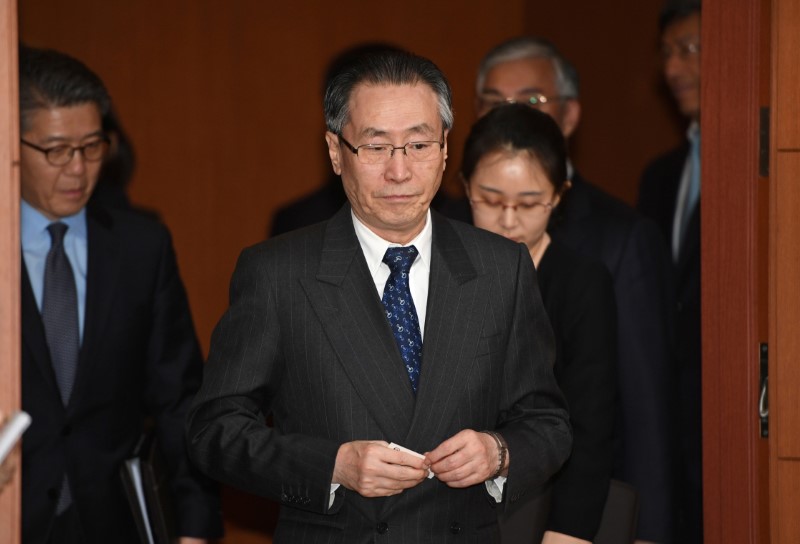By Jack Kim and Christian Shepherd
SEOUL/BEIJING (Reuters) - The travels and travails of China’s veteran point man on North Korea underscore China’s growing frustration in its efforts to broker a negotiated solution to rising tensions between North Korea and the United States.
Wu Dawei, 70, spent an unusually long five days in Seoul last week. He met with presidential candidates as well as South Korea's chief nuclear envoy, partly in a bid to ease tensions as a U.S. aircraft carrier group headed toward the region ahead of U.S. Vice President Mike's Pence's visit this week.
But Wu had not been able to confirm plans to visit North Korea, South Korea’s Yonhap news agency quoted a diplomatic source as saying: “I understand the Chinese side is asking but the North is not replying.”
Chinese foreign ministry spokesman Lu Kang said on Monday he had no information to share about any such visit, adding that “China and the DPRK maintain the tradition of friendly exchanges”.
The last time Wu visited Pyongyang, in early February last year, his job was to urge restraint after North Korea announced a plan to put a satellite into orbit with a long-range rocket. Two days after his return to Beijing, North Korea launched the rocket, widely viewed as a ballistic missile test in disguise, further ratcheting up tensions on the Korean peninsula.
China has shown growing willingness to supplement diplomacy with enforcement of United Nations Security Council sanctions against its unpredictable neighbor across the Yellow Sea. It banned all coal imports from North Korea from Feb. 26 as it grows increasingly impatient with North Korea's development of nuclear weapons and ballistic missiles, including a failed missile test-launch on Sunday morning.
Officially, however, China supports dialogue above all, leaving Wu the thankless job of trying to coax North Korea and its neighbors and rivals back to the negotiating table.
MORE DISTANT TIES
U.S. President Trump has asked China's President Xi Jinping to take stronger measures to stop North Korea's programs to develop nuclear weapons and ballistic missiles. North Korea relies heavily on China for food and fuel and the vast majority of its exports go through China.
Xi, however, has yet to meet North Korea's young leader Kim Jong Un since the Chinese president took power in 2012 and ties between the two countries have become more distant since Pyongyang began accelerating its missile and nuclear programs since Kim became leader at the end of 2011.
For over a decade, Wu led Beijing's mostly fruitless efforts to denuclearize the Korean peninsula under so-called Six Party talks between China, the United States, North and South Korea, Japan and Russia. They've been suspended since the last round collapsed in 2008 following a failed rocket launch in North Korea.
Wu is a career diplomat and Japan expert who, according to South Korean officials, speaks little Korean and no English.
Wu has earned a number of friends in South Korea and a reputation as a "credible" diplomat over the years, according to one Asian diplomat who declined to be named because he was not authorized to speak to the media.
The highlight of the Six Party era came shortly after Wu took up his position, when the sides reached an agreement for phased denuclearization of the peninsula in September 2005.
That deal was soon scuppered, however, when North Korea carried out its first nuclear test in October 2006 then pulled out of the discussions in 2009. Since then, China has been most vocal in calling for their resumption.
'DUAL SUSPENSION'
In a rare interview with Hong Kong's Pheonix Television that aired on Friday, Wu conveyed China's position that Washington and Pyongyang should agree to a "dual suspension" of nuclear tests and military drills as a foundation for returning to talks - a stance opposed by both the United States and its ally South Korea.
Wu did not mention sanctions during the interview, reiterating China's commitment to a peaceful resolution through dialogue, the same stance Chinese President Xi Jinping expressed to U.S. President Donald Trump in a phone call last week.
"If the DPRK and U.S.-Republic of Korea's tit-for-tat posturing and mutual displays of strength fail to fundamentally change, then sooner or later something will go wrong on the Korean Peninsula," Wu told Phoenix, referring to North and South Korea by their official names.
The South Korean official said that while Wu was sometimes "abrasive" during the early rounds of Six Party talks, "he was just the person we needed at the time to keep the talks alive."
"At times (he would) argue with envoys to keep them on track, at times cajole them, or warn about the fallout if the talks break down and we walk away empty-handed, leaving the North to continue on.”
“He would do that all the while chain-smoking," the official added.
Former South Korea nuclear envoy Chun Yung-woo, who later served as vice foreign minister, gave a less flattering assessment, calling Wu China's “most incompetent official”, citing his lack of English and stalwart adherence to China's party line, according to a 2010 U.S. diplomatic cable released by Wikileaks.
Chun could not be reached for comment.
